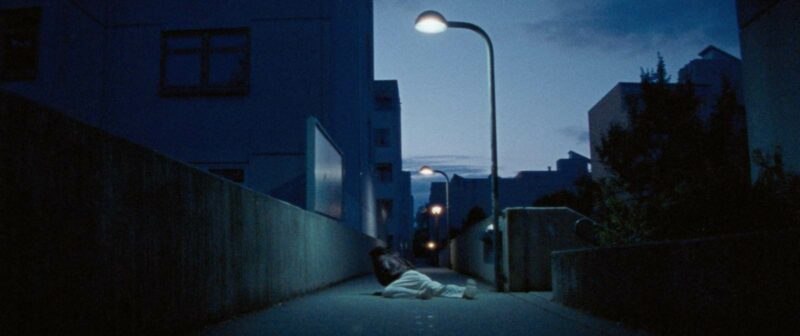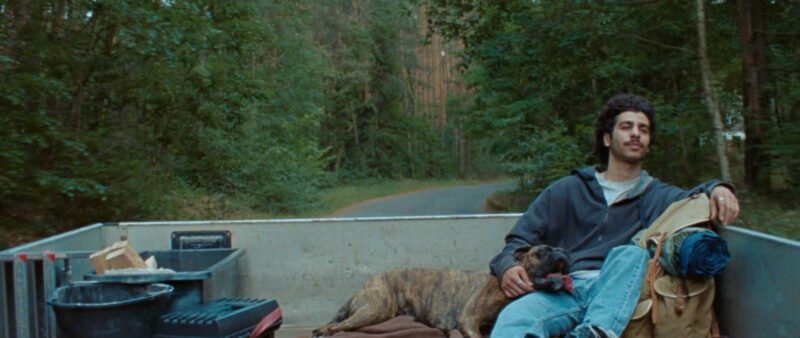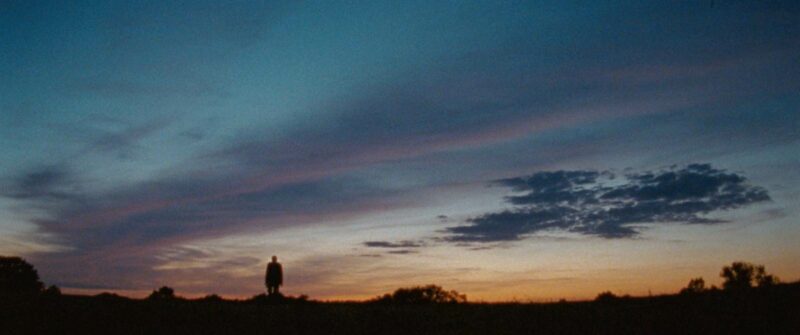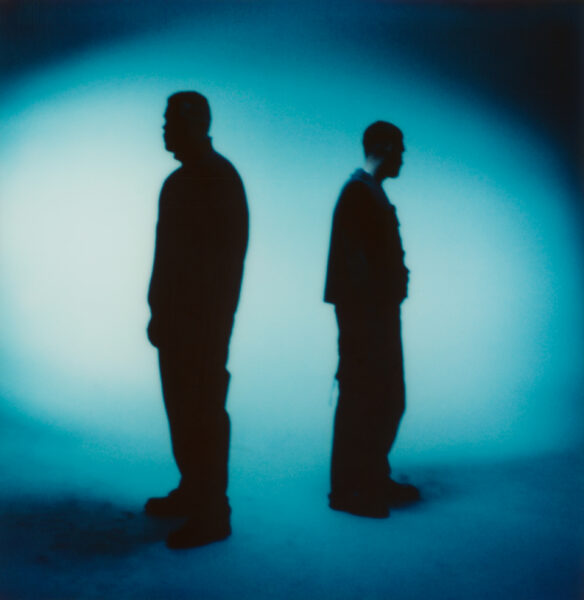Mental health. While the topic has gained visibility in the last decade, it fluctuates between being stigmatized or capitalized off in a profit-orientated society. Yet, depression is an issue that in Germany, according to Robert Koch Institut, every seventh adult experiences at least once in their lifetime. Sitting at the intersection of various structural problems, depression, and other mental-health-related issues affect people differently, hitting marginalized groups the hardest. Therapy remains expensive and available places are hard to find (in Berlin the search can take several years). Plus, therapy is not always a safe space and discrimination continue to occur in therapy sessions. It is obvious that there is a lot of work to do and a lot of conversations to be had.
Berliner Duo Modha, Dhanya Langer and Max Scholl, decided to approach the topic from a creative angle and released a collaborative record Through the Cycle that raises awareness for mental health issues. Produced by Dhanya Langer and Max Scholl, the record is an open and vulnerable musical conversation with several contributors. It will be accompanied by a cinematic short film directed by Nils Hansen.
Breaking the Cycle
The ten tracks on Through the Cycle emerged from intimate conversations that Modha had with artists realizing just how broadly people are affected by psychological distress. There lies power in talking about these things openly, finding out that you are not alone, and that other people are experiencing similar things. Opening up and allowing the necessary vulnerability to grow can be scary but ultimately has the power to create solidarity and build community. That is what Through the Cycle represents. Based on their instrumental neo-soul, hip-hop, and jazz-influenced arrangements, the duo invites collaborators Noah Slee, PHABO, Candice Nembhard also known as okcandice, FAYIM, and Jermaine Peterson to speak their minds and share their experiences. The result is a record teeming with sincerity and pain, but also joy and the hope that these conversations will change the way we approach mental health.
“We hope to create an understanding of how individual and complex mental health experiences are, yet how they are tied to history, society, and structural injustice. We are also aware of the fact that we only cover a small sample size of individual experiences, but if anyone relates to anything on this album and in this film we feel very grateful for this connection.” – Modha
Recording from a Safer Space
Music and creative expression can be a place to heal. Yet, recording and working with several people, especially as independent musicians can cause further distress and influence the artists negatively. Stress and discrimination can be as present in music-making just like anywhere else. That environment is something that the process of Through the Cycle aims to dismantle. Modha comment; “as producers we try to create a space where an artist feels comfortable sharing anything they want. We´ll make sure to cover the technical side and give input where needed, so the artist can fully dive into the creative process. If a session goes really well, nobody thinks about the technical side of creating and those moments are incredibly valuable and joyful.”
“Working with Modha made me realise how important it is to feel safe in your creative process.” – Candice Nembhard
Through sharing their emotions and individual experiences, Dhanya and Max, created a base of trust. This allowed the collaborators to openly talk about their emotions without fear of being judged or stigmatized. Noah Slee describes the process: “Dhanya shared his thoughts on addressing individual experiences with mental health. The beauty of that concept brought collective oneness that we were all sharing from a vulnerable perspective.” For the director Nils Hansen the initial conversations they had collectively shaped the creative process. “It felt very beautiful and special to build this project around these multiple perspectives and conversations and it taught me that a simple decision of two people opening up about some of the darkest times in their lives can start a chain reaction that can create something that not only benefits them but is meaningful and healing to many.”

Still from “Through The Cycle”
Poet and spoken word artist Candice Nembhard worked on the personal and evocative piece Call It Luck and remembers the safe atmosphere recording with Modha: “I wrote and recorded the song in a day at Dhanya’s studio in Berlin. Keep in mind this is the second time we’d ever met overall, and we opened up ourselves in a vulnerable way. Despite not knowing much of each other personally, we formed a quick bond through common musical interests, mutual friends, and our personal experiences with mental health issues and responsibilities. We established common ground before approaching the music and I believe that was instrumental in us being able to record a song that was raw, honest, and a reflection of companionship.”
“Our main concern throughout the process was to create a space that is safe and comfortable enough for people to talk about the way life feels sometimes. How incredibly tough it can be, but that there is always an opportunity to find beauty further down the road. These conversations create community and connection, and we don’t have enough of them. The album has now become this space and I truly believe, that if you sit down and spend time with it you will feel something. And when you do, let’s talk about it.” – Nils Hansen
Learning and Growing
The process of working on the record with such an intimate approach and topic encompassed many lessons for the producers and the collaborators. Modha share that the thing that surprised them the most – in a positive way – was that once they decided to approach the album this way and to center conversations about mental health, people opened up. “As we started talking to musicians, product management, and film crew, everybody had a story to share – a point of view,” they describe. This makes Through the Cycle a mosaic of personal experiences that resonates on a profound emotional level.
“Working on ‘Growth’ and the conversations with Dhanya and Juju Rogers taught me, that the musical greats do not hold back on the truth. They express themselves with flaws and all. That’s how their audience relates to them so deeply. We are all on a journey with ups and downs. These conversations challenged me to reach into my conscience and express thoughts that I wouldn’t usually open up about to other people, whilst thinking technically about how the melody and tone of voice would carry the message.” – Jermaine Peterson
Creativity and Mental Health
Creativity and creative expression are one way to share emotions and to find out that you are not alone. Music can transport emotions and make you feel less alone with struggles of any kind, especially those stigmatized like mental health. Singer Jermaine Peterson says: “The creation of music has many uses, from simply having a good time/dance with a heavy beat and catchy melody, to expressing your innermost feelings and emotions.” Working on Through the Cycle and explicitly having a record targeting the topic of mental health changed the way Modha approach music and recording, they say.
The duo describe how “listening to and creating music has a therapeutic side to it. But often it is also a place to hide and feel safe. It’s not a particular conscious space, which is important, but eventually, our experiences in life made us ask the question: „What do we really want to talk about in our music? „Let’s be very clear about it in our album and not hide. Let’s create a counterpoint to the commercialized neo-liberal self-care narrative“. As important as awareness is, the washing and trendiness of mental health can be disturbing at times if you factor in how complex this topic really is.”
“Once you’ve switched off and given space to vulnerability and experimentation beautiful things can happen.” – Noah Slee
“Creating art gives you the opportunity to tell your story and allows you to regain control over moments in which you felt completely helpless. It can be extremely liberating to realize that you’re not a product of your past and are in charge of your narrative. But you need to be able to let go at a certain point. It’s a delicate path, that I’m still learning to navigate.” – Nils Hansen
Call It Luck
From the collaboration between Modha and Candice Nembhard emerged the song Call It Luck. Beginning with a jazzy composition, their edgy spoken word verses provide a stark contrast just to then melt into a soft chorus. Vocal harmonies accompany the extended trumpet solo, then Nembhard recites their lines again, this time only accompanied by drums. “This is my life from within”, they sing, and the dynamic changes of the song highlight its broad range of emotions. The song intimately describes the artist’s personal relationship with grief and how to cope with memories of person lost. Candice Nembhard asks heavy-weight questions like: “What do I do with the life I have yet to live? How do I continue to find joy and purpose?”
“Music has been a huge part of my grieving process and dealing with depression. But sometimes, the thought of putting my thoughts into song actually prompts more anxiety, fear, and confusion. For me, music is a tool. It’s a portal. It gives me the opportunity to see, change and revise things; enter a new world if I need to. But I can also hide in it. It can act like a safety blanket for feelings I don’t want to deal with.
I recently went through a bunch of my old notebooks that had songs and poems I’d written between the ages of 10-16. Flicking through the lyrics, I was surprised at how open I was about my struggles with mental health. As a child, I didn’t have any pretences. I didn’t have the vocabulary to intellectualise my pain. I just felt it. When I make music now, I try to write simply, like I did when I was a child. To be honest about what I’m experiencing instead of hiding behind the language to mask what’s bubbling underneath. I’m not always consistent with taking that approach, but I appreciate the moments where I catch myself trying to be ‘clever’ in a song and then scrap the line or the verse in favour of something more direct. I guess music helps me understand what I’m hiding and how I can be more transparent with myself.”
Strength in Vulnerability
“I believe that true artistic strength only exists with the willingness for extreme vulnerability”, says the director of the short film, Nils Hansen. Through the Cycle created a space like that and works to dismantle capitalist belief systems of vulnerability being bad. Candice Nembhard explains how the premise of the project and the openness and collective vulnerability allowed them to “lift the veil on something [they] had been dealing with privately and find love and care to wrap it in.”
Modha add: “The framing of emotions relates to the society and system we live in. In a capitalist society, emotions that lead to productivity and therefore potential financial success, are framed as positive. In a capitalist belief system, we measure our self-worth around being productive and therefore only allow room for a small spectrum of emotions that help us achieve success. So, our creative process very much tries to abandon these beliefs and make room for every possible emotion. For us, this really embodies the core of creative work.”

Still from “Through The Cycle”
Keeping the Conversation Going
Throughout all of its heaviness, Through the Cycle contains a message of hope and joy. Found in the collective experience and in knowing that you are not alone, the album is an encouragement to open up, and to destigmatize vulnerability and conversations around mental health. Noah Slee describes his hopes for the record: “The more airtime these conversations have, the less lonely people will feel. It’s important that these stories are told from an authentic place, and I hope to continue the conversations. It’s time we normalise the conversation around mental health.”
“I hope that “Growth”, whilst based in a negative setting, can spark some hope in listeners that may be feeling something similar. When we hit a low point, we can focus on how bad things are or we can acknowledge that these are lessons that we can learn from and use to grow from our past and improve our future. I hope we can spark conversation about what it means to be a vulnerable, strong man in a society that is afraid to be seen as weak through various external influences.” – Jermaine Peterson
“The album overall touches upon a number of facets related to the human experience. My hope is that listeners not only find care and relatability in the lyricism but they’re touched by the texture of the record. There are so many layers in the musicality of the project; a lot of magic musicians and engineers were able to make the album shimmer. I hope folks that engage with the work are able to talk about the quality of the production as well as the nuances of the subject matter. A lot of love, loss, dreams, and sacrifice went into making ‘Through The Cycle’ and my hope is that all that effort it’s recognised by those who listen.” – Candice Nembhard

Still from “Through The Cycle”
Through the Cycle is out now. On Thursday the 6th of April Modha celebrate the release in Berlin. Get your tickets here.



